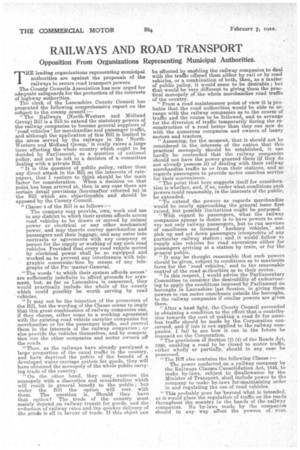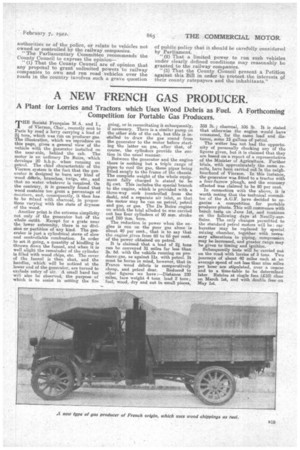RAILWAYS AND ROAD TRANSPORT
Page 20

Page 21

If you've noticed an error in this article please click here to report it so we can fix it.
THE leading organizations representing municipal authorities are against the proposals of the railways to secure road transport powers. The County Councils Association has now urged for adequate safeguards for the protection of the interests of highway authorities.
The clerk of the Lancashire County Council has presented the following comprehensive report on the subject to the county council:—
"The Railways (North-Western and Midland Group) Bill is a Bill to extend the statutory powers of the railway companies to become general suppliers of 'road vehicles' for merchandise and passenger traffic, and although the application of this Bill is limited tO the areas served by the railways in the 'NorthWestern and Midland Group,' it really raises a large issue affecting the whole country which ought to be decided by Parliament, as a question of national policy, and not be left to a decision of & committee dealing with a private Bill. "It, is this question of public policy, rather than any direct attack in the Bill on the interests of ratepayers, that I venture to think should be the main factor for consideration. When a decision on that point has been arrived at, then in any case there are certain detail provisions (hereinafter referred to) in the Bill which are objectionable and should be opposed by the County Council.
"Clause 4 of the Bill is as follows:— The company may provide, own, work and use in any district to which their system affords access road vehicles to be drawn or moved by animal power or electrical or any other mechanical power, and may therein convey merchandise and passengers and their luggage, and may enter into contracts or agreements with any company or person for the supply or working of any such road vehicles. Provided that every road vehicle moved by electrical power shall be so equipped and worked as to prevent any interference with telegraphic eommuniestion by means of any telegraphs of the Pos master-General.
The wards 'to which their system affords access' are sufficiently indefinite to afford grounds for argument, but, so far as Lancashire is concerned, they would practically include the whole of the county which could possibly be worth serving by road vehicles.
"It may not be the intention of the promoters of the Bill, but the wording of the Clause seems to imply that this great combination of railway companies can, if they choose, either come to a working agreement with the existing road vehicle carryina companies for merchandise or for the passenger traffic, and control them in the interests of the railway companies ; or else provide the vehicles themselves, and by competition run the other companies and motor owners off the roads.
"Then, as the railways have already paralysed a large proportion of the canal traffic in the country, and have deprived the public of the benefit of a developed water-carriage system for goods, they will have obtained the monopoly of the whole public carrying trade of the country.
"On the other hand, they may exercise the monopoly with a discretion and consideration which will result in general benefit to the public ; but under the Bill the option will rest with them. The question is, Should they have that option? The trade of the country must mainly depend on railway transit for goods, and the reduction of railway ratesand the quicker delivery of the goods is all in favour of trade. If this object can be effected by enabling the railway companies to deal with the traffic offered them either by rail or by road vehicles, or a combination of both, then, as a matter of public policy, it would seem to be desirable ; but that would be very different to giving them the practical monopoly of the whole merchandise road traffic of the country. " From'a road maintenance point of view it is probable that the road authorities, would be able to ar range with the railway companies as to the course of traffic and the routes to be followed, and to arrange for the diversion of traffic temporarily during the re construction of a road better than they can now do with the numerous companies and owners of heavy motors and tractors.
"Assuming, for the moment, that it should not be considered •in the interests of the nation that this practical monopoly should be established, it can hardly be contended that the railway companies should not have the power granted them (if they do not already possess it) of dealing with their railway merchandise traffic to or from their stations, and as regards passengers to provide motor omnibus service for their convenience.
"The point that here suggeats itself for consideration is whether, and, if so, under whateonditions such powers could reasonably, in the interests of the public, be extended.
"To extend the powers as regards merchandise would be nearly approaching the general is-sue first raised, but possibly limitationa might be purposed.
"With regard to passengers, what the railway i companies appear to desire s to have powers to con vey not only railway passengers, but to run services of omnibuses as licensed hackney vehicles,' and pick up and set down passengers irrespective of any particular railway station ; and it would follow to supply also vehicles for road excursions either for passengers arriving at a station by train, or for the general public. • "It may be thought reasonable that such powers should be given, subject to conditions as to maximum fares for the road vehicles,' and to the reasonable control of the road aethorities as to their routes.
"In this respect, I would advise the Parliamentary Committee to consider the desirability of endeavour ing to apply the conditions imposed by Parliament on boroughs in Lancashire last Session, in giving them powers to run motor omnibuses outside the boroughs, to the railway companies if similar powers are given them.
"After a hand fight, the County Council succeeded in obtaining a condition to the effect that a contribu tion towards the cost of making a road fit for omnibus traffic should be made by the Corporation concerned, and if tnis is not applied to the railway companies, I fail to see how it can in the future be imposed on the Corporation. "The provisions of Section (7) (4) of the Roads Act, 1920, enabling a road to be closed to motor traffic, either wholly or partially, should in any case be presumed.
"The Bin also contains the following Clause :— The power conferred on a railway company by the Railways Clauses Consolidation Act, 1845, to make by-laws, subject to disallowance by the Minister of Transport, shall include power to the company to make by-laws for Imaintaining order in and regulating the use. of road vehicles.
"This probably goes far 'beyond what is intended, as it would place the regulation of traffic on the roads throughout the country in the hands of therailway companies. No by-laws made by the companies should in any way affect the powers of_ roar. authorities or of the police, or relate to vehicles not owned or controlled by the railway companies.
" The Parliamentary Committee recommends the County Council to express the opinion— "(1) That the County Council are of opinion that any proposal to grant unlimited powers to railway companies to own and run road vehicles over the roads in the country involves such a grave question
of public policy that it should be carefully considered by Parliament. "(2) That a limited power to run such vehicles under clearly defined conditions may reasonably be granted to the railway companies. "(3) That the County Council present a Petition against this Bill in order to protect the interests of their county ratepayers and the inhabitants."




























